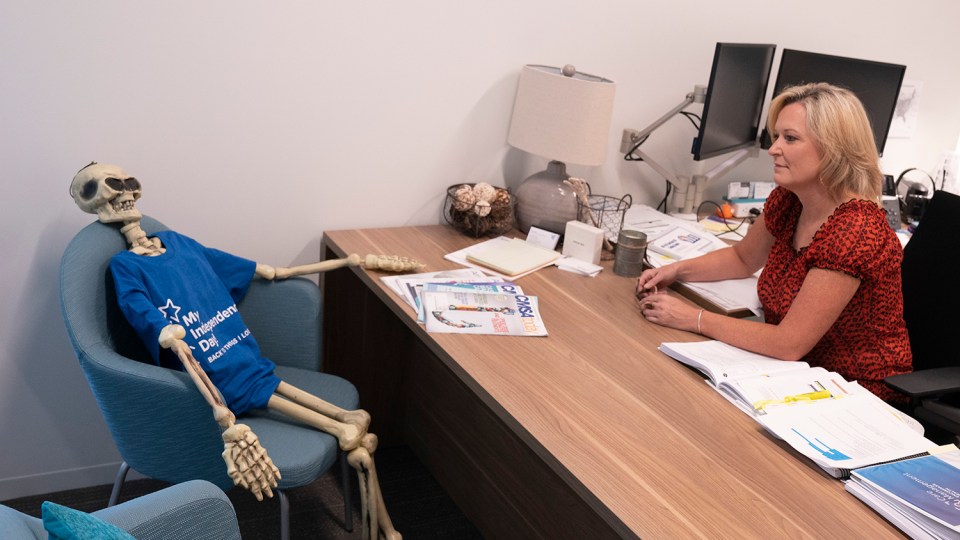Encompass Health is proud to welcome Dina Walker as the national director of case management.
Dina Walker, Encompass Health’s new national director of case management, can be described as professional, fun-loving, knowledgeable and most importantly passionate. Dina is a registered nurse by background, and has experience with healthcare from the bottom up.
“I did my nursing career in Montgomery, Alabama and then I moved up to the Birmingham area about eight years ago to work for a large Medicare Advantage insurance company. I was over case management there. I’ve got a well-rounded healthcare background, and case management has been my latest addition to that experience,” Dina said.
“In the Medicare Advantage Plan, I managed all facets of case management. Acute care case management, inpatient rehab, skilled nursing facilities, community case management with a huge focus on managing transitions of care, avoiding readmissions and preventive health. I previously was the Southeast regional director of case management here at Encompass Health for the past two years and recently was promoted to the national director.”
As a former nurse and case manager, Dina knows the ins and outs about the healthcare field, and she is excited to use those experiences in her new role.
“I’m passionate about leading and coaching our case managers and case management directors. I’m a huge believer in leading by example and modeling the behavior that I want to see in others. Except when I’m being goofy,” Dina said with a laugh. “I’m really passionate about empowering case management directors, and through them, empowering the front-line case managers. So, how great is it to be in a role where you can have that kind of influence and making that kind of a difference? As opposed to me being the case manager and making the difference in my caseload patients’ lives, I can indirectly impact so many more in this role, so I’m pretty passionate about that. Growing, leading and coaching people to be the best that they can be.”
A history in case management
Dina understands and emphasizes the importance the work that case managers do on the ground level, and she wants to nurture their talents as part of Encompass Health’s interdisciplinary care team.
“When I think of what a case manager does, I think of a detective of sorts. We’re the one who has to interview people, gather bits and pieces of information and put the whole thing together. And then come up with the best plan for that patient,” Dina explained.
“We don’t just rely on one avenue to get things done; we have to rely on multiple avenues in our interdisciplinary care team and our resources outside the hospital. So we have to speak to a lot of people to collect a picture of that patient, the family or the caregiver. Assessing the patient’s prior level of life is what I call it. A lot of people might say prior level of function, I say prior level of life, because we have to treat the person as a whole. So how were they prior to their acute event that happened to them and brought them to the acute care hospital, and eventually brought them to us? And then, how do we bridge those gaps and meet those needs once the patient leaves our doors in the best way that we can?”
Dina explained how she is continually learning to hone those detective skills and how those experiences will apply to her work on the national level.
“I always take a first-hand approach in growing, leading and coaching my people. So I often would shadow my case managers as they went through a day in their life, seeing our beneficiaries. I was with a Medicare Advantage plan, so we were responsible for taking care of those beneficiaries and managing their healthcare and keeping them well. So I shadowed a community case manager. We had interviewed this one female beneficiary in the acute care hospital, and my case manager went on to tell her about some different kinds of medications. She mentioned to her that she had probably seen advertisements for the medication on TV. And the patient stopped her case manager and she said, ‘Honey, I don’t have a TV. I don’t have a phone. The things that you’re trying to tell me don’t pertain to me.’ I was so amazed, No. 1, that the patient took the initiative to correct the case manager and bring her to where she was, because the information she was giving her was irrelevant to her. She wasn’t going to be able to follow up with her by phone after she got out of the hospital because she didn’t have a phone. We took that for granted. When you’re dealing with patients, especially in an acute care hospital, everybody’s got a hospital gown on, they all look the same and they kind of lose their identity and uniqueness,” Dina recalled.
“You never know where people are coming from and what forces impact where they’re at in their lives. Don’t take anything for granted, don’t go in with what you think you know, but take another two steps back and maybe approach it another way.”
A national scale
As the former Southeast regional director of case management, Dina is now ready to step up to the plate on a national scale.
“I want to assess the current state of where we’re at now. How can I say where we’re going to go or if I don’t know where we’ve been? I’m really working on finding out the history at the national level. I think I know a little bit of that history by virtue of the regional role that I was in, but I want to truly assess our current state because I may have perceptions that aren’t true. I want to asses and then elevate where we’re at. I definitely want to move us forward, I don’t want to stay where we’re at because we can’t. Healthcare is moving and changing and shifting so rapidly, and we have to move and bend and flex with it,” Dina said.
“I want to elevate the thinking of our directors of case management to not be complacent, I want them to go out and seek information, don’t wait for someone to deliver it to you. Look at your processes, your people, your workflows and your environment with new eyes. With fresh and objective eyes. Healthcare is changing so much, and we’ve been kind of in an inpatient rehabilitation bubble for a while. We need to break out of that bubble and see the shifting and changing healthcare community around us. How do we fit into that wider healthcare community, and how are we actively participating in that community? I want to ensure we are being good stewards of our healthcare resources and actively participating in the healthcare community and working on partnering with other healthcare providers in that community and working on aligning our goals.”
The content of this site is for informational purposes only and should not be taken as professional medical advice. Always seek the advice of your physician or other qualified healthcare provider with any questions you may have regarding any medical conditions or treatments.


